Kellogs Special K and Corn Flakes are two popular kinds of breakfast cereal eaten in many countries worldwide; they look similar, but which is best?
In this article, I’ll be comparing Kellogs Special K and Corn Flakes against each other head to head to find out which is the best for nutrition, cost, and flavor.
Key Takeaways
Special K and Corn Flakes, both popular Kellogg’s cereals, have distinct nutritional profiles and costs. While Corn Flakes is the winner in terms of calorie content, sugar, fat, fiber, and price, Special K stands out for its lower carbohydrate content, higher protein, lower sodium, and richer vitamin and mineral content. Ultimately, Corn Flakes takes the overall win, but the choice between the two depends on individual nutritional priorities and taste preferences.
Read on to find out everything you need to know and help us find out which you like best by participating in our voting poll.
Also in This Article
In a hurry, or looking for something specific? Use the links below to jump to the relevant section:
Special K Vs. Cornflakes Nutritional Comparison:
Ingredients Comparison – Whats the Difference?
Before we get started on the nutrition comparison, let’s take a look at the ingredients for each kind of cereal.
As you can see from the ingredients table below, the main difference between Special K and Corn Flakes is that Special K is made from Rice, and as the name suggests, Corn Flakes are made from Corn.
Both kinds of cereal are fortified with various vitamins and minerals, which I’ll compare head-to-head later on in this article.
| Special K Ingredients | Corn Flakes Ingredients |
| Rice, wheat gluten, sugar, defatted wheat germ, contains 2% or less of salt, malt flavor, bht for freshness. vitamins and minerals: reduced iron, vitamin c (ascorbic acid), niacinamide, vitamin e acetate, beta-carotene, folic acid, vitamin b6 (pyridoxine hydrochloride), vitamin b1 (thiamin hydrochloride), vitamin b2 (riboflavin), vitamin d3, vitamin b12. | Milled corn, sugar, malt flavor, contains 2% or less of salt. vitamins and minerals: iron (ferric phosphate), niacinamide, vitamin b6 (pyridoxine hydrochloride), vitamin b2 (riboflavin), vitamin b1 (thiamin hydrochloride), folic acid, vitamin d3. Vitamin b12. |
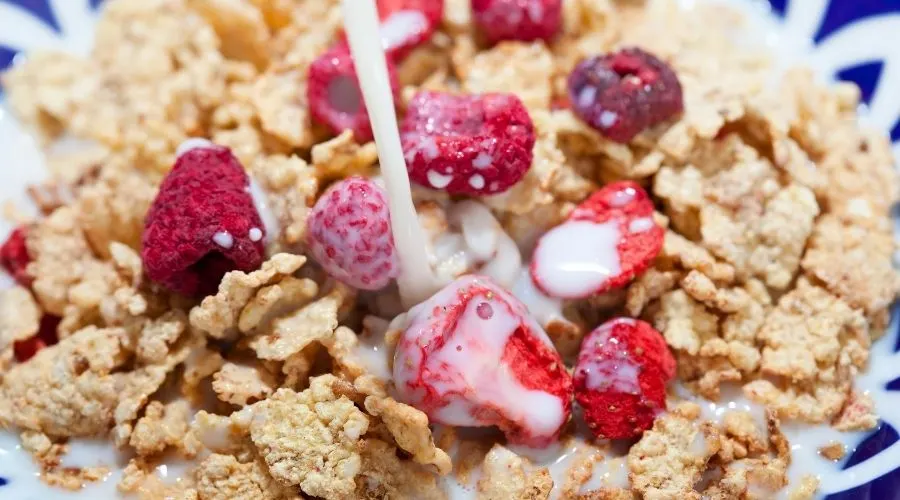
Special K Vs. Corn Flakes Nutritional Comparison
We’ll now move on to compare each aspect of nutrition for each kind of cereal to find which is the best in each category.
Each cereal has a slightly different recommended serving size, so I’ve included a weight-for-weight comparison (per 100g) to ensure the data is as accurate as possible.
For confirmation, I’ll be comparing Kellogs Special K Original Vs. Kellogs brand Corn Flakes.
Best for Calorie Content
Starting with calorie content, I can confirm that the cereal with the least calories between Special K and Corn Flakes is Corn Flakes.
Although they have the same amount of calories per recommended serving at 150kcal per portion, a serving of Corn Flakes weighs slightly more, making them the lower calorie option weight-for-weight.
| Cereal Type | Calories Per 100g | Calories Per Serving |
| Kelloggs Special K Original | 385kcal | 150kcal (per 39g serving) |
| Kelloggs Corn Flakes | 357kcal | 150kcal (per 42g serving) |
Best for Carbohydrate Content
Neither type of cereal is classed as low-carb, but if this is something you need to consider, then Special K is the lower carb option between the two, with 8g fewer carbs per 100g than corn flakes.
| Cereal Type | Carbohydrates Per 100g | Carbohydrates Per Serving |
| Kelloggs Special K Original | 74g | 29g (per 39g serving) |
| Kelloggs Corn Flakes | 86g | 36g (per 42g serving) |
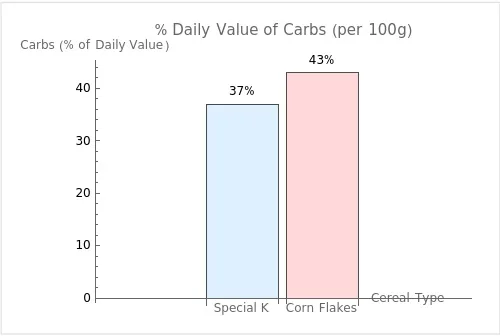
Based on a 2,000 calorie diet, the recommended daily intake of carbohydrates is about 300 grams. This means:
- Special K has approximately 37% of the daily value of carbs per 100g.
- Corn Flakes has approximately 43% of the daily value of carbs per 100g.
Best for Sugar Content
When it comes to added sugar, both types of cereal are relatively low in sugar, and both contain the same amount of sugar per serving, but weight-for-weight, Special K contains slightly more sugar.
| Cereal Type | Sugars Per 100g | Sugars Per Serving |
| Kelloggs Special K Original | 10.3g | 4g (per 39g serving) |
| Kelloggs Corn Flakes | 9.5g | 4g (per 42g serving) |
Best for Protein Content
If you’re looking for a cereal that gives you more protein per serving, then when comparing Special K against Corn Flakes, Special K is the higher protein option with more than double the amount of protein per serving than Corn Flakes.
| Cereal Type | Protein Per 100g | Protein Per Serving |
| Kelloggs Special K Original | 18g | 7g (per 39g serving) |
| Kelloggs Corn Flakes | 7g | 3g (per 42g serving) |
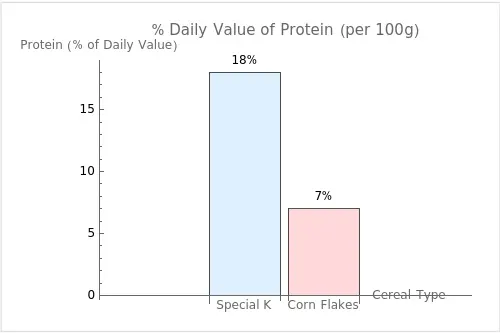
Based on a 2,000 calorie diet, the recommended daily intake of protein is about 50 grams. This means:
- Special K has approximately 36% of the daily value of protein per 100g.
- Corn Flakes has approximately 14% of the daily value of protein per 100g.
Best for Fat Content
If fat content is a consideration for you, then Corn Flakes are the best option, with no fat or saturated fat per serving. Although Special K contains some fat, it’s a nominal amount per serving, and they don’t have any saturated fat either.
The tables below show both fat and saturated fat content per serving and weight-for-weight per 100g.
Per 100g
| Cereal Type | Fat Per 100g | Saturated Fat per 100g |
| Kelloggs Special K Original | 1.3g | 0g (per 39g serving) |
| Kelloggs Corn Flakes | 0g | 0g (per 42g serving) |
Per Recommended Serving
| CerealType | Fat Per Serving | Saturated Fat per Serving |
| Kelloggs Special K Original (per 39g serving) | 0.5g | 0g |
| Kelloggs Corn Flakes (per 42g serving) | 0g | 0g |
Cholesterol
If cholesterol is something you need to keep track of, I can confirm there’s no cholesterol in either Kelloggs Original Special K or Corn Flakes.
Best for Fiber Content
When it comes to fiber content, both Special K and Corn Flakes are low in dietary fiber compared to higher fiber whole grain cereals.
Corn Flakes contain slightly more dietary fiber, but it’s still a nominal amount per serving.
| Cereal Type | Dietary Fibre Per 100g | Dietary Fibre per Serving |
| Kelloggs Special K Original | 1.4g | <1g(per 39g serving) |
| Kelloggs Corn Flakes | 3.3g | 1g (per 42g serving) |
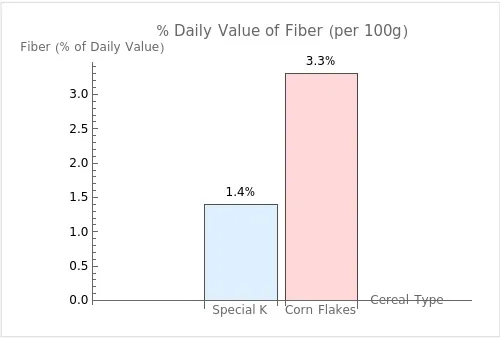
Based on a 2,000 calorie diet, the recommended daily intake of dietary fiber is about 25 grams. This means:
- Special K has approximately 5.6% of the daily value of fiber per 100g.
- Corn Flakes has approximately 13.2% of the daily value of fiber per 100g.
Best for Sodium/Salt Content
When it comes to sodium (salt), both kinds of cereal contain similar amounts, but Corn Flakes have slightly more than Special K per serving.
To put this into context, of a daily value percentage (daily allowance), Special K contains 12% of the sodium daily recommended allowance compared to Corn Flakes, which are 13%.
| Cereal Type | Sodium/Salt Per 100g | Sodium/Salt per Serving |
| Kelloggs Special K Original | 667mg | 270mg (per 39g serving) |
| Kelloggs Corn Flakes | 729mg | 300mg (per 42g serving) |
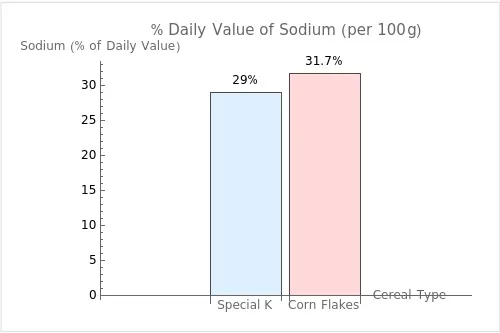
The recommended daily intake of sodium is about 2,300 mg for most adults. This means:
- Special K contains 667 mg of sodium per 100g, which is approximately 29% of the daily recommended intake.
- Corn Flakes contains 729 mg of sodium per 100g, which is approximately 31.7% of the daily recommended intake.
Best for Vitamins/Minerals
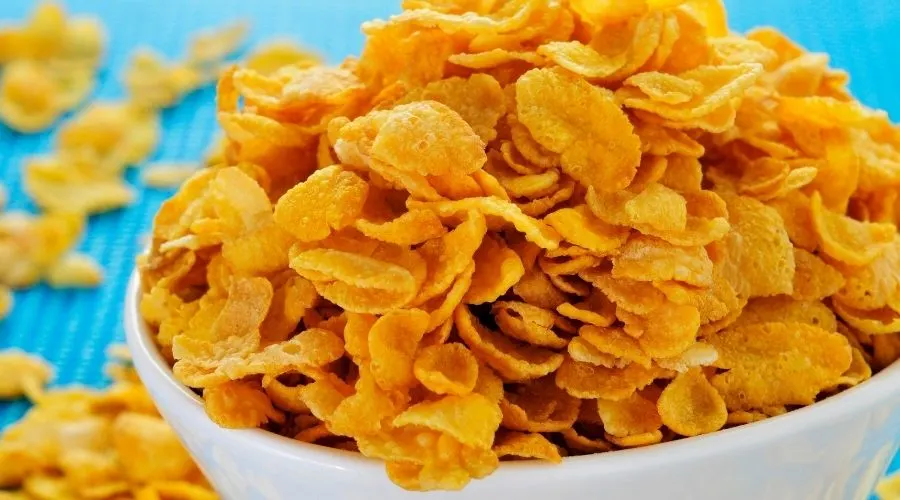
Both Kelloggs Original Special K and Corn Flakes are fortified breakfast cereals which means they have added vitamins and minerals in a bid to get more of the consumers’ daily allowance into their everyday diets.
Special K has higher amounts of vitamins and minerals in more categories than Flakes, including more calcium, thiamin, riboflavin, Vitamin B6, and Vitamin C.
Corn Flakes contain more Vitamin D, Iron, Potassium, and Magnesium per 100g than Special K.
| Vitamin/Mineral Type | Amount of Nutrient Per 100g of Special K | Amount of Nutrient Per 100g of Corn Flakes |
| Vitamin D | 3.3mcg* | 7.1mcg |
| Calcium | 23mg* | 5mg |
| Iron | 28mg | 28.9mg |
| Potassium | 53mg | 168mg |
| Magnesium | 12mg | 39mg |
| Thiamin | 1.69mg | 1mg |
| Riboflavin | 1.91mg | 1.52mg |
| Niacin | 22.6mg | 17.9mg |
| Vitamin B6 | 6.44mg | 1.79mg |
| Vitamin C | 68mg | 21mg |
*mcg = microgram / mg = miligram
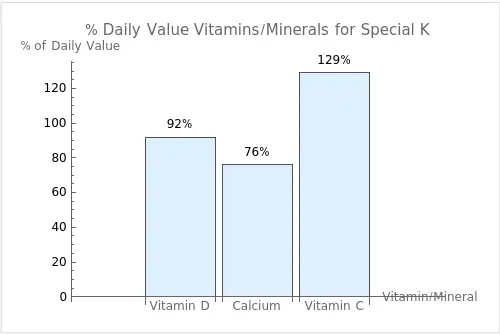
Based on the recommended daily values:
Vitamin D: The recommended daily intake is about 20 micrograms (mcg). Special K provides 3.3 mcg per 100g, which is approximately 16.5% of the daily value.
Calcium: The recommended daily intake is about 1,000 milligrams (mg) for most adults. Special K provides 23 mg per 100g, which is approximately 2.3% of the daily value.
Vitamin C: The recommended daily intake is about 90 milligrams (mg) for men and 75 mg for women. Special K provides 68 mg per 100g, which is approximately 75.6% of the daily value for men and 90.7% for women.
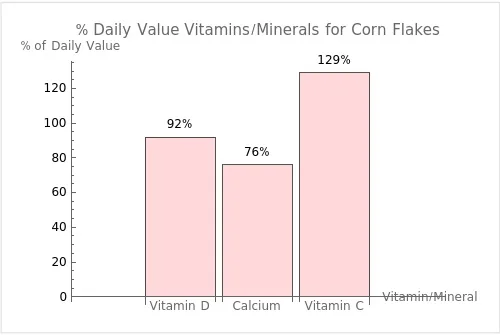
Based on the recommended daily values:
Vitamin D: The recommended daily intake is about 20 micrograms (mcg). Corn Flakes provides 3.3 mcg per 100g, which is approximately 16.5% of the daily value.
Calcium: The recommended daily intake is about 1,000 milligrams (mg) for most adults. Corn Flakes provides 23 mg per 100g, which is approximately 2.3% of the daily value.
Vitamin C: The recommended daily intake is about 90 milligrams (mg) for men and 75 mg for women. Corn Flakes provides 68 mg per 100g, which is approximately 75.6% of the daily value for men and 90.7% for women.
Best for Flavor/Texture
When it comes to flavor and texture, it’s not easy to judge a winner because it’s down to the individual which they prefer.
To get a range of opinions, we’re taking a poll to find out which cereal Special K or Corn Flakes is the public favorite.
Submit your vote below (no personal information required) to find out which is the favorite so far.
Best for Price
At the time of writing this article (March 2022), Corn Flakes cost an average of $3.28 for a family-sized (18oz) pack, and Special K cost $3.72 for the same sized pack.
Based on these figures Corn Flakes are the lower-cost option compared to Special K.
Overall Winner
We’ve now covered all categories, and I can announce a winner of the best cereal for nutrition and price, and the winner is – Corn Flakes.
Although it was a close competition with Corn Flakes winning five out of nine categories, Corn Flakes came out on top for calorie content, lowest sugar, lowest fat, slightly higher fiber, and best for price.
Let’s not forget the runner-up, though, because Special K came out on top for lower carbs, higher protein, lower sodium, and higher vitamins and minerals.
So depending on what’s most important to you when it comes to choosing a cereal, you can now make an informed choice based on the information in this article.
| Comparison Category | Winner (Special K or Corn Flakes) |
| Best for Calorie Content | Corn Flakes |
| Best for Carbohydrate Content | Special K |
| Best for Sugar Content | Corn Flakes |
| Best for Protein Content | Special K |
| Best for Fat Content | Corn Flakes |
| Best for Fiber Content | Corn Flakes |
| Best for Sodium Content | Special K |
| Best for Vitamins/Minerals | Special K |
| Best for Price | Corn Flakes |
| Overall Winner | Corn Flakes |
Related Articles
I hope this article has helped you to find the information you were looking for; you might also find the following articles helpful too:
Original Cheerios Vs. Corn Flakes (Which Are Best?)
Cheerios Vs. Honey Nut Cheerios (Which is Best?)
Brown Sauce Vs. Ketchup (What’s the Difference?)
References Used for this Article
To ensure the nutritional information used in this article is accurate, I have used data from both the original producers and the USDA; the links below contain the source information:
Special K USDA Nutritional Information
Special K Smart Label Nutritional Information
